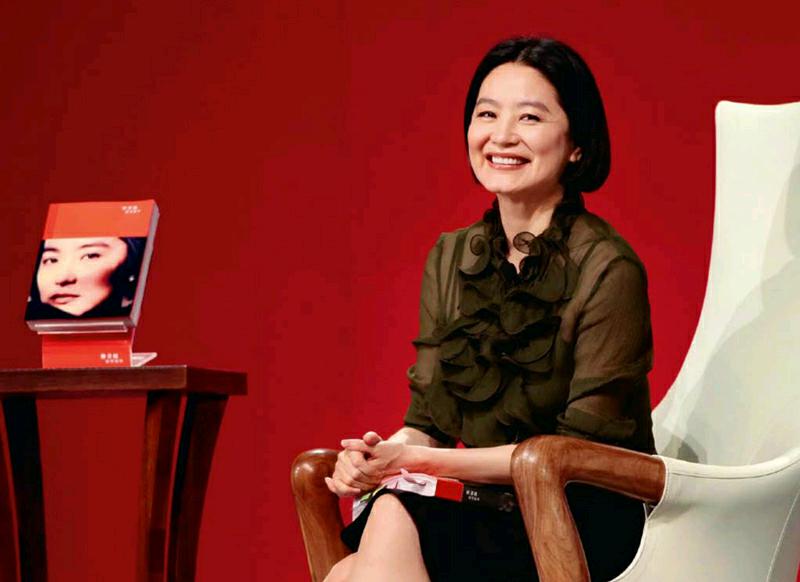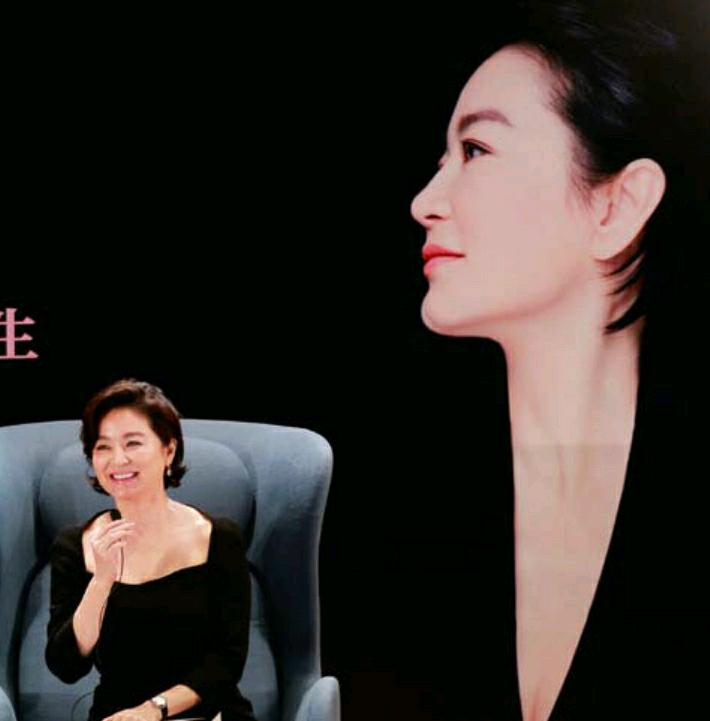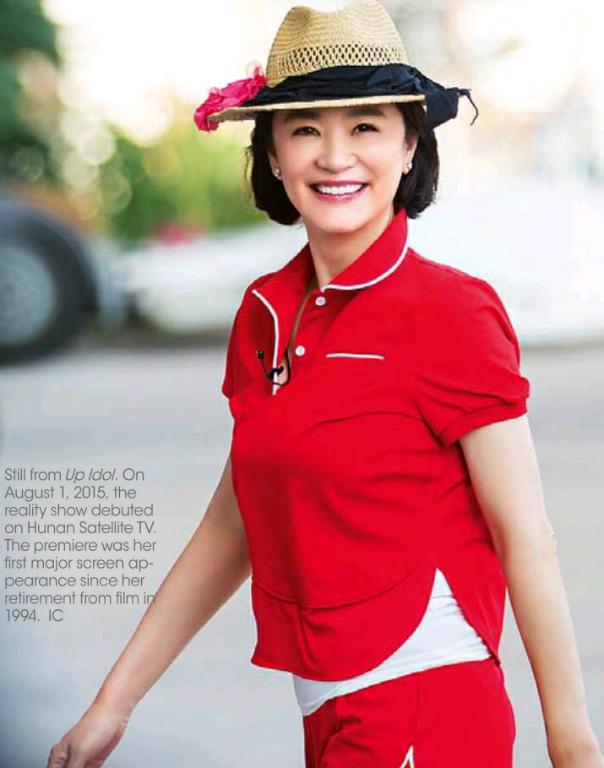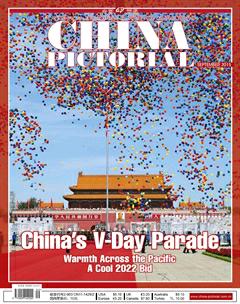Brigitte Lin:Writing Her Own Role
by+Huang+Tongtong
Taiwan-born actress Brigitte Lin starred in more than 100 movies in the 22 years between her 1972 debut in Outside the Window, adapted from the novel by Chiung Yao, and her final film in 1994.
The prime of her career coincided with the respective golden ages of movies from Hong Kong and Taiwan, during which time she became well-known for literary films as well as martial arts movies. She played a key role in boosting Taiwans film production in the 1970s before earning even greater popularity in Hong Kong in the 1990s, becoming a trans-island legend of her time.
On August 1, 2015, the debut of Up Idol, a reality show on Hunan Satellite TV, brought Brigitte Lin back into the spotlight. The premiere was her first major TV appearance since her retirement from film in 1994. Not only did her return bring the other actors to tears, but afforded flashes of her “good old days” on the screen.
-Decade Superstar
An iconic figure of Chinese movie and popular culture, Lin dominated three decades with her unique performing art.
Her first appearance on screen was as the lead of female Taiwan-born novelist Chiung Yaos 1963 book Outside the Window when it was adapted into a film. Many of the novelists bestsellers have been adapted into movies and TV series, proving extremely popular with viewers.
Lin shot to fame overnight after her debut. By 1982, she had played the lead in 12 movies adapted from Chiung Yaos novels, each a hit. “She was the top choice to bring my heroines to life with her elegant, beautiful qualities,” the novelist opined.
“During the 1980s, soon after Chinas mainland opened its door wider to the outside world, its sky was lit by three stars from Taiwan: singer Teresa Teng, novelist Chiung Yao and actress Brigitte Lin,” recalls Zhang Yihe, a famous Chinese writer, expounding on Lins influence. “At their peak, people were listening to Tengs songs on almost every street corner, reading Chiungs novels in whatever light they could find, or watching movies starring Lin.”
In the 1980s, Lin became a welldeserved leader of Hong Kongs New Wave movies. “I consider myself lucky,” she grins.“In 1984 when Taiwans movie market experienced a transformation, Ringo Lam from Hong Kong asked me to work on his movie, Gwan Ji Ho Kau. I said ‘yes. I assumed I would return to Taiwan after filming, but I ended up staying another 10 years: Hong Kong turned into my second home.”
A string of New Wave Hong Kong directors such as Ringo Lam, Tsui Hark, Patrick Tam and Yim Ho tapped into the star, transforming Lin to an iconic, fashionable, and independent woman through films including Love Massacre, Police Story, and Peking Opera Blues. In 1990, she starred in Red Dust directed by Yim Ho and took Best Actress at the 27th Golden Horse Awards in Taiwan.
In 1992, Swordsman II directed by Tsui Hark brought Lin one of the most memorable roles in the history of Chinese martial arts movies. In the film, she succeeded in portraying a male, a common convention of Chinese movies and operas. Her neutral beauty was first discovered in 1977 by Li Han-hsiang, a director from Taiwan, when she was asked to play Jia Baoyu, the male protagonist in The Dream of the Red Chamber. In 1986, director Tsui Hark offered her a more challenging role in Peking Opera Blues, and Swordsman II marked the peak of her career in terms of box office earnings.
Turn to Pen
Lin was sensitive and fragile when she was young. “You must be extremely careful with her,” remarks Yi Shu (Isabel Nee Yeh-su), a popular Hong Kong writer. “She seemed fragile because she was oversensitive and cautious.”
Nobody expected her to return to the stage as a writer, nearing her sixties, after retreating from public life for so many years.
Brigitte Lins debut book, In and Out of the Window, was published in 2011. In 2014, soon after the celebration of her 60th birthday, her second book, Clouds: Coming and Going, hit shelves.
The first books cover features a still from Red Dust in which she appeared in 1990, an era in which she was still struggling in an unsteady relationship, as evidenced from her beautiful yet thoughtful eyes. The second is quite different: Nobody could imagine a 60-year-old womans portrait being so modern, sexy, and proud. Her hair is short, her smile is sweet and her eyes shine, depicting an attractive elegance and attitude. She seems like a goddess of wisdom, open and relaxed, broad and fearless.
Was she born to be a legend? She didnt receive any higher education, and disliked reading. Today, however, she has matured into a first-rate intellectual.
Lin has often talked about her journey to writing.
In 2004 she wrote a 2,000-character story for the memorial service for Wong Jim, a distinguished musician from Hong Kong and composer of the theme song of Swordsman II. Her article was published by Ming Pao without edits, greatly inspiring her enthusiasm for writing about everything from her career to her friends and relatives and insights about life.
She has become driven and actively shifted from superstar to writer. Her greatest inspiration is Simone de Beauvoir(1908-1986) from France. After diving deep into the trade, she tightened contact with writer friends from both Taiwan and Chinas mainland, including Tung Chiao, Chiang Hsun, Lung Ying-tai, and Zhang Yihe, exchanging ideas about her new area.
“Im going to write novels,” she announced. “And I want to establish a cul- ture salon.”
A beauty who led an era of Chinese movies, Brigitte Lin was once hailed as a goddess of popular Chinese culture. She has chosen to shift cultural paths to the literary realm for life. In terms of inherited traits needed to excel in popular Chinese culture in the 20th Century, Lin was lucky for sure. But her own sweat brought her acceptance as a writer. Brigitte Lin experienced just one possible fate of a beautiful woman, who once existed as an object of desire, and later developed the courage and wisdom to contribute all she could as a human.

